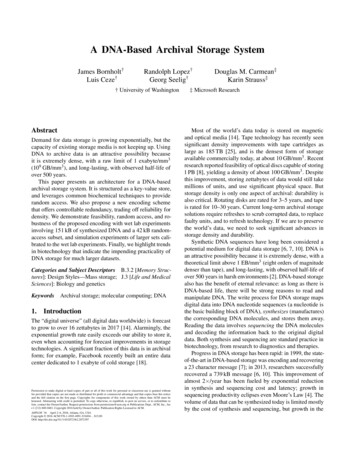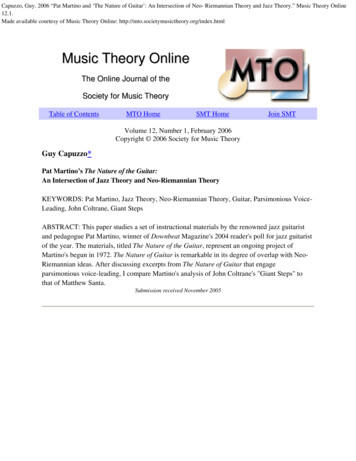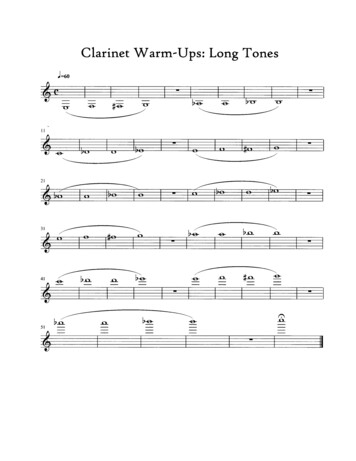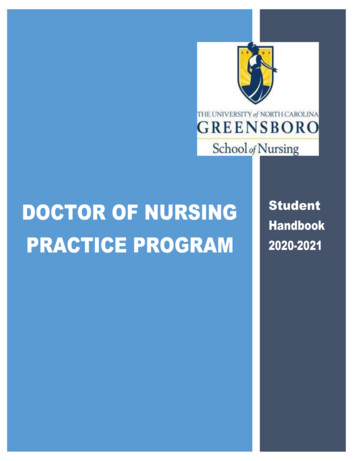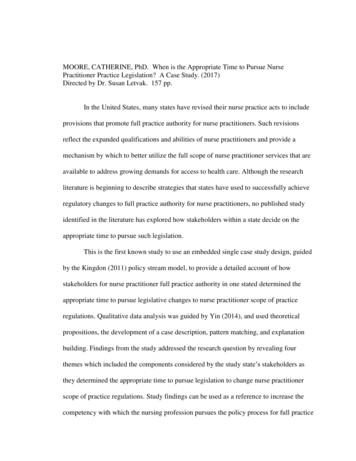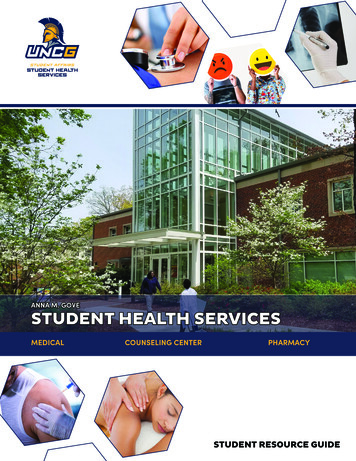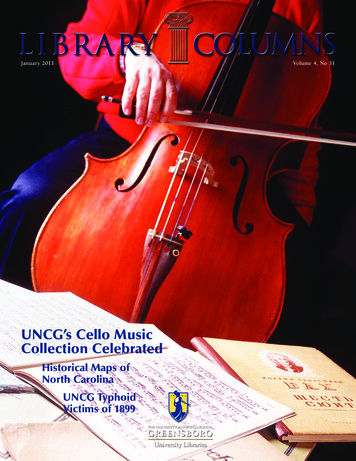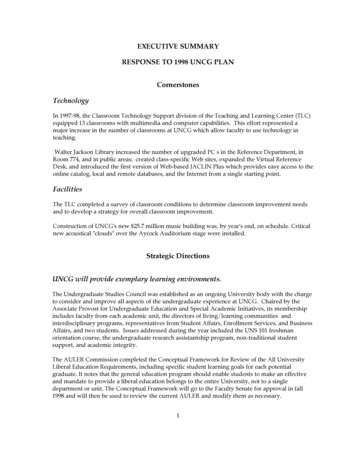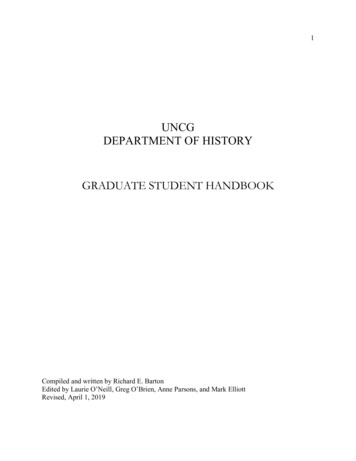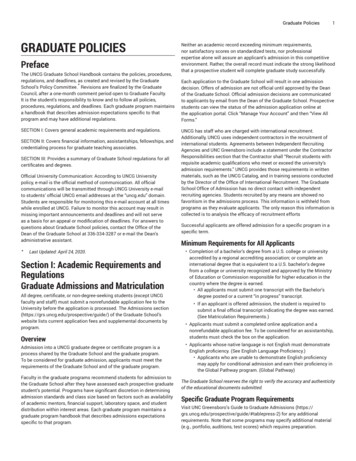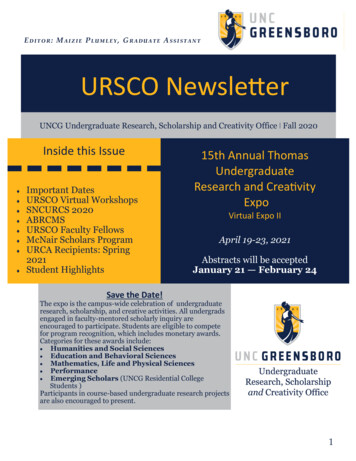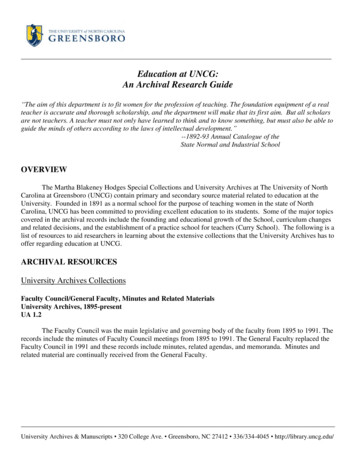
Transcription
Education at UNCG:An Archival Research Guide“The aim of this department is to fit women for the profession of teaching. The foundation equipment of a realteacher is accurate and thorough scholarship, and the department will make that its first aim. But all scholarsare not teachers. A teacher must not only have learned to think and to know something, but must also be able toguide the minds of others according to the laws of intellectual development.”--1892-93 Annual Catalogue of theState Normal and Industrial SchoolOVERVIEWThe Martha Blakeney Hodges Special Collections and University Archives at The University of NorthCarolina at Greensboro (UNCG) contain primary and secondary source material related to education at theUniversity. Founded in 1891 as a normal school for the purpose of teaching women in the state of NorthCarolina, UNCG has been committed to providing excellent education to its students. Some of the major topicscovered in the archival records include the founding and educational growth of the School, curriculum changesand related decisions, and the establishment of a practice school for teachers (Curry School). The following is alist of resources to aid researchers in learning about the extensive collections that the University Archives has tooffer regarding education at UNCG.ARCHIVAL RESOURCESUniversity Archives CollectionsFaculty Council/General Faculty, Minutes and Related MaterialsUniversity Archives, 1895-presentUA 1.2The Faculty Council was the main legislative and governing body of the faculty from 1895 to 1991. Therecords include the minutes of Faculty Council meetings from 1895 to 1991. The General Faculty replaced theFaculty Council in 1991 and these records include minutes, related agendas, and memoranda. Minutes andrelated material are continually received from the General Faculty.University Archives & Manuscripts 320 College Ave. Greensboro, NC 27412 336/334-4045 http://library.uncg.edu/
Academic Cabinet/Faculty Senate, Minutes and Related MaterialsUniversity Archives, 1976-2006UA 1.3The Academic Cabinet advised the chancellor about academic policies and procedures, recommendedprocedures for implementing the decisions of the Council, advised the Faculty Council, and maderecommendations to the chancellor, the Council, and other University offices regarding University policy.There records include minutes and related materials from the Academic Cabinet, dating from 1976 to 2006. InSeptember, 1991, the Faculty Senate replaced the Academic Cabinet.Chancellor Records: McIver, Charles DuncanUniversity Archives, 1855-1906UA 2.1 (available on microfilm)This collection contains the personal papers and official records of Charles Duncan McIver (1860-1906),the founder and first president of the State Normal and Industrial School (now UNCG) from 1892-1906. Allaspects of School operations can be seen in this collection which includes correspondence, speeches, schoolforms, publications, and other material. In addition, one group of papers concerns the Southern EducationBoard (S.E.B.), established in 1901. (Boxes #11-27, microfilm reels #11-20) The S.E.B. helped stateorganizations campaign for a more liberal educational investment on the part of the people (local taxation).Items in the second group of McIver's papers include a copy of "An Act to Establish a Normal and IndustrialSchool for White Girls.” (Box #138, microfilm reel #123)Chancellor Records: Foust, Julius IsaacUniversity Archives, 1903-1970UA 2.2Julius Isaac Foust (1865-1946) served as president from 1906-1934. Many of his official papers dealwith the academic development of the College. This was a period of substantial program growth. For example,vocal and school music was introduced in 1907 (Hoexter), and the first hint of a Drama Department appeared in1926 (Taylor). New programs included an extension division (Gray 1917), canning and home demonstration(Home 1916), and commercial teacher training (Commercial 1932). In 1909, there was mention of upgradingthe curriculum to meet emerging new national college standards (W.C. Smith).Chancellor Records: Jackson, Walter ClintonUniversity Archives, 1934-1950UA 2.3Walter Clinton Jackson (1879-1959) was the Dean of Administration at the Woman’s College of TheUniversity of North Carolina at Greensboro (now UNCG) from 1934 to 1945 and served as chancellor from1945 to 1950. In 1932, the North Carolina College for Women became part of the Consolidated University ofNorth Carolina, along with the University of North Carolina at Chapel Hill and the North Carolina State Collegeof Agriculture and Engineering at Raleigh (now North Carolina State University). Under Jackson, the Collegeestablished new departments such as Art and Philosophy. Material in the collection includes correspondenceand reports concerning student affairs, construction of new buildings on campus, and the establishment of newacademic departments.
Chancellor Records: Graham, Edward KidderUniversity Archives, 1950-1956UA 2.4Edward Kidder Graham (1911-1976) served as chancellor from 1950-1956. Highlights of this collectioninclude documents connected with the study of General Education (General Education, 1951-54). Thiscollection also documents the introduction of the nursing program (Nursing, 1951), the establishment of thenursery school (Departments, Home Economics, 1952), the inauguration of educational television (Television,1952, 1953), and the creation of the Department of Drama (Committees, 1954). There is also material regardingthe beginning of student evaluation of teaching (Committees, Student Faculty Committee on the Evaluation ofTeaching, 1953).Chancellor Records: Moran, William EdwardUniversity Archives, 1979-1994UA 2.9William Edward Moran (1932- ) served as chancellor from 1979-1994. This collection includesdocuments regarding Academic Affairs, the American Council on Education, the American Association of StateCollege & Universities, the Faculty Council, the National Council for Accreditation of Teacher Education(NCATE), North Carolina Association of Colleges & Universities, the Southern Association of Colleges andSchools (SACS), and the records for each department and school within the University. The increasing level ofgovernment regulation in education can be seen in the documentation of Moran’s interaction with variousfederal and state agencies.College of Arts and Sciences, Office of the Dean of theUniversity Archives, 1953-2006UA 4.1The Office of the Dean of the College of Arts and Sciences is responsible for providing the curriculaleading to most baccalaureate degrees for undergraduate students at the University. Their records also containmaterial related to the development of various academic programs.Counseling and Educational Development, Department ofUniversity Archives, 1981-2005UA 6.2The records of the Department of Counseling and Educational Development contain reports andnewsletters which document the activities of the Department from 1981-2005.Curry SchoolUniversity Archives, 1898-2004 [bulk 1928-1970]UA 6.4The teacher training school, formed in the 1890’s, was a “practice” school for education students.Housed on the University’s campus, many of the students were children of faculty and staff. In 1902, it wasnamed the Curry School in honor of Jabez Lamar Monroe Curry. The records of the Curry School containalumni lists, directories, newsletters, pamphlets, programs, transcripts, yearbooks, and other records whichdocument the activities of the School. Information about the Curry School may also be found in the Records ofthe School of Education, 1957-1972.
Educational Research Methodology, Department ofUniversity Archives, 1977-2002UA 6.6These records contain annual reports, correspondence, memoranda, case studies, evaluation reports, andself-studies which document the activities of the Department from 1977-2002. In addition to departmentalreports, this collection includes reports about local education that were produced by the Department’s Center forEducation Research and Evaluation during the 1980s and 1990s.Library and Information Studies, Department ofUniversity Archives, 1931-2007UA 6.7The records of the Department of Library and Information Studies contain correspondence, memoranda,brochures, minutes, annual reports, course proposals, surveys, reports, self-studies, audio cassettes, and VHStapes which document the activities of the Department from 1931-2007.School of Education, Office of the Dean of theUniversity Archives, 1957-2010UA 6.1These records document the activities of the Office of the Dean for the School of Education. Highlightsinclude institutional reports and self-studies for the National Council for Accreditation of Teacher Education(NCATE), 1962-1991. This collection also includes records for UNCG’s Teachers Academy including minutesof the Teacher Education Council (1958-1973) and the Teacher Education Coordinators Cabinet (1974-1987).Course CatalogsUniversity Archives, 1892-2010UA Reference 3These course catalogs list courses offered at the University between 1892-2010. These listings offerinsight into changes in the curriculum over the years.Institutional Self StudiesUniversity Archives, 1972-2002CF N86iUNCG’s self-studies records include reports from all academic departments as well as a larger report onthe overall state of the University between 1972 and 2002.Office of the Chancellor, Chancellor’s ReportUniversity Archives, 1948-2007CF C45cThese yearly chancellor’s reports give a brief overview of events and developments at the University.Topics covered include academic departments, enrollment, facilities, art and culture on campus, fund raising,and other campus programs and trends. These reports provide a convenient overview of the University’sgrowth.
Office of Institutional Research, Fact BookUniversity Archives, 1979/80, 1994-2002CF N86iThese statistical abstracts of the University reflect enrollment numbers, retention and graduation rates,diversity of the student body, academic department statistics, and other information about the School.Task Force on Academic Planning, Quo VadimusUniversity Archives, 1987CF A168qThis prospectus, published by the Task Force on Academic Planning in 1987, is based on a self-study ofthe University. It is a draft and presents an evaluation of UNCG’s academic values, strengths, condition, andpossibilities for advancement.Oral History CollectionUNCG Institutional Memory Collection2006- presentOH 002The UNCG Institutional Memory Collection was established in 2006 by the University Archives tocollect the history of UNCG through oral histories. Archives staff members have interviewed former students,staff, and faculty to preserve the untold memories of their experiences at UNCG.UNCG Centennial Oral History Project Collection1989-1991OH 003The UNCG Centennial Oral History Project was created in conjunction with the centennial celebrationof UNCG’s founding in 1891. This collection includes over 175 interviews with former students, staff, andfaculty members discussing various topics and recounting their experiences at UNCG. A complete finding aid isavailable in the Archives with a short description of each interview.Pat Fairfield-Artman Oral History Collection2004OH 005This collection focuses on UNCG’s transition from a woman’s college to a coeducational university. Itincludes interviews with Laura Anderton, Jean Buchert, Dorothy Darnell, Rosemary McGee, Jane TuckerMitchell, Clara Rider, Sarah “Sally” Robinson, and Nancy White.UNCG Alumni Association Oral History Program Collection1972-1979OH 007This collection of interviews with UNCG alumni focuses on women who attended Woman’s College(now UNCG). Highlights include a 1976 interview with alumna Kathleen P. Hawkins who describes instructionand curriculum during the School’s transition from a normal school to a four-year college.
UNCG Centenary Project1980-1982OH 008This is a collection of interviews with alumnae of Woman’s College (now UNCG). Not all interviewsare transcribed. An interview with Gertrude Carraway describes her experience at Woman’s College, includingexams, the curriculum, literary societies, and her further education at Columbia University.UNCG in the 1960s1960-1969OH 013This is a collection of six interviews with people who were associated with UNCG during the 1960s asstudents, faculty, or staff.Subject FilesThe University Archives houses individual subject files on the following topics:Academic Affairs, Office of, 1969-2003Academic Policies, 1971-1992Graduate School, ?-1994; 1995-Histories of Academic Development UNCGAdmissions, Office of, 1949-2009Adult, Continuing, and Evening Student ProgramAdult Students, Office forAfrican American StudentsArts and Sciences, College ofBeaufort Summer School, 1924-1954Center for Continued Education for WomenHistory, 1891-1932; 1933-1962; 1963History- ConsolidationHistory- Curriculum (development), 1931-1981Instructional Resources CenterLearning Resources CenterLibrary- General, 1933-2005State of the University Conference, 1st (1953), 2nd(1954), 3rd (1955), and 4th (1956)Student AssignmentsSummer SessionTelevision- CoursesThe Elementary Principal, 1942Teacher EducationTeachers AcademyWomen’s Education Club of the State Normal andIndustrial SchoolCenter for Educational Research and EvaluationCenter for Educational Studies and DevelopmentCo-educationContinual Learning, Division of, Fall 1974- Fall 1995Continual Learning, Division of, Fall 1974- Fall 1995Continuing Education, Office ofCollegiums for the Advancement of Schools,Schooling and EducationCurry SchoolEducation, School of, 1889- Summer 1982Education, School of, Fall 1982- 1992Education, School of, 1993Education, School of- Dept. of EducationalAdministration, Higher Education & EducationResearchExtension Division, 1921-1974 (became core of thenew office of Continuing Education, May 1974)General EducationGeneral Education- Evaluation StudiesGrading
Biographical FilesThe Biographical Files are a ready reference collection relating to individual alumni, faculty, and staff ofthe University. The collection contains a variety of themes such as articles, biographical information sheets,correspondence, magazine clippings, news releases, obituaries, resumes, vitae, and other material relating to thelife of an individual. There are over 6500 Biographical Files. For a full list please contact or visit the UniversityArchives.PhotographsThe UNCG University Archives contains several photographic collections related to education atUNCG. Some of the topics include:UA 104.6UA 104.6UA 104.6UA 104.6Commencement 1910’sConsolidated University Day (formerly Greater University Day), 1951Honorary Degree Recipients- 1962Scholarships, Awards, etc., 1952-2000Articles“Our Training School”Allen, Nettie M.Alumnae News, 4 (April 1916)This article chronicles the history and development of the Curry School from its founding in October1893 to April 1916. It provides a firsthand account from Nettiee Allen who was a teacher at the Curry School.“Curry School: A Proving Ground”Bowles, E.Alumni News, 55 (Fall 1966)This article provides a brief history of the Curry School and includes several photographs documentingthe growth of the School.UNCG Magazine (called Alumnae News from 1923-1962 and Alumni News from 1962-1998)University ArchivesCS N86aUNCG Magazine publishes interviews with prominent faculty and alumni, along with articles aboutresearch activities and student life at UNCG.The Carolinian Student NewspaperUniversity Archives, 1919-presentThe Carolinian is UNCG’s student newspaper. Articles in The Carolinian describe campus events andcurrent issues and concerns throughout the University’s history. Newspaper issues from the last six months areavailable in Jackson Library’s Reading Room while previous copies are available on microfilm in the generalstacks.
UNCG News Bureau, New ReleasesUniversity Archives, 1930-2010UA Reference-8These news releases cover a variety of topics including faculty research and achievements, Universityactivities, and student honors.Books and DissertationsBowles, Elisabeth. The University of North Carolina at Greensboro, 1892-1931. Ph.D. Thesis Chapel Hill,NC: University of North Carolina at Chapel Hill, 1965.University ArchivesCE1 B78uDr. Bowles’ thesis traces the development of UNCG from its origins as the State Normal IndustrialSchool in 1891 through its 1931 merger with the University of North Carolina and the North Carolina StateCollege of Agriculture and Engineering (now North Carolina State University). Topics covered includecurriculum, instruction, and faculty.Gallien, Louis Bertrand Jr. The Coeducational Transition of the Woman’s College of the University ofNorth Carolina: Case Study in Organizational Change. Ed.D. Dissertation Greensboro, NC: University ofNorth Carolina at Greensboro, 1987.University ArchivesCE1 G162cIn this dissertation, Gallien focuses on the Woman’s College’s 1963-1964 transition to a coeducationalinstitution. The dissertation is structured as a historical case study with administrator interviews and surveys offaculty members who were part of the transitionTrelease, Allen W. Making North Carolina Literate: The University of North Carolina at Greensboro, fromNormal School to Metropolitan University. Durham: Carolina Academic Press, 2004.Jackson Library, call number: LD3952 .T744This book provides an extensive history of The University of North Carolina at Greensboro from its foundingin 1891 up through 1994. It includes information about the history of the School of Education as well as education ingeneral at UNCG.Online Exhibits and ResourcesPine Needles-Yearbooks, is website is a comprehensive online collection of UNCG yearbooks. Yearbooks were publishedbetween 1902 and 1993, first as The Decennial (1902), later as The Carolinian (1909-1917), and finally as PineNeedles (1920-1993).
Timeline of UNCG ibits/timeline/pages/index.htmThe Timeline of UNCG History is an interactive web exhibit that outlines the history of UNCG from itsfounding as a women’s normal school in 1891, to its present day status as a major research university. Topicscovered by the timeline include curriculum changes, campus construction, and prominent faculty,administrators, and alumni. The timeline is searchable and contains over 100 photographs.UNCG School of Educationhttp://www.uncg.edu/soe/The UNCG School of Education is home to one of the top teacher education programs in the state ofNorth Carolina. It offers Bachelor’s, Master’s, and Doctoral degree programs in a variety of teaching areas thathelp students prepare to be successful teachers, counselors, administrators, library and media specialists, andeducational researchers.Sean Mulligan and Mendy OzanAugust 2011
Carolina at Greensboro (UNCG) contain primary and secondary source material related to education at the University. Founded in 1891 as a normal school for the purpose of teaching women in the state of North Carolina
